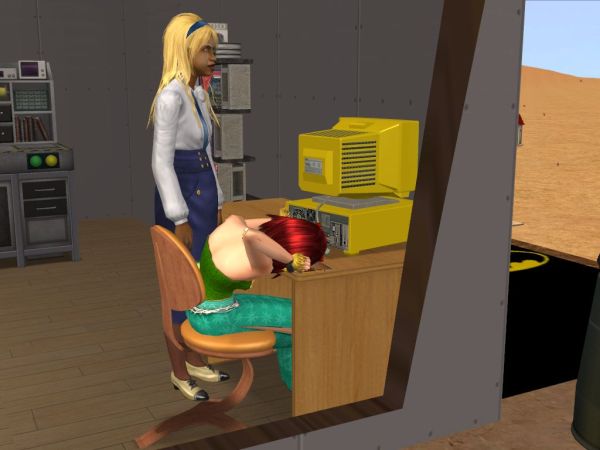 I have reason to believe that the word “headdesk” did not exist until the coming of  computer networks…
I have reason to believe that the word “headdesk” did not exist until the coming of  computer networks…
This morning I decided to skip the Holosync session. After all, I had slept 7 hours, slightly more than I usually did before I even started these experiments. Besides, I was planning to do a 40-minute LifeFlow 10 today, the first of these. The demos have tended to make me more sleepy rather than less, but that would be a concern for the afternoon when I did that brainwave entrainment.
But already on the commute bus to work I became very sleepy and napped for much of the way. Â This is something that rarely ever happened even before I started syncing in the morning. Â Perhaps if I slept only half the night or if I got up very early. But I was actually half an hour late (thank you, large intestine) and had slept for 7 hours. Â Huh. Â At work I became sleepy again after lunch, although 10 minutes of focused counting meditation cleared that up. Â Still, later in the workday I became sleepy AGAIN and napped for 10-15 minutes. Â Either the brain does get used to the morning sync or it has a really good placebo effect!
Still haven’t gotten along to testing the “industrial strength” version of LifeFlow as of 20:10 (8:10 PM DST). This is because of the Linux laptop. Â I have used it almost exclusively to play music at work for a good while now, but I can do that with the Vista laptop. Â It just isn’t as easy with iTunes as it is with Amarok, the KDE music player. Well, that probably does not tell you much unless you came here by searching for Amarok, KDE, or “Linux music” – and I sincerely hope this entry is many pages down on any of those searches!
Anyway, I don’t play much music anymore. It happens, but it has diminished greatly of late, and more so now that I can directly hack into my brainwaves with low-frequency sound effects. Between this and the speeches of the “researchers” in this area, my “recently played” list looks nothing like its old self. Â So I took the old HP pavilion ze5600 with me home finally.
This ties in with my rant about Norton antivirus, last seen in my March 27 entry.  With my relationship to  Symantec back to enemy level (I know it’s been there once before) there is only a firewall between me and an Internet raging with worms.  Unlike viruses, which passively drift along with stuff you download (mail included), worms are actively trying to get into your computer and infect it through any one of the many thousand ports that opens you to the Internet.  The obvious solution is to have a firewall, which closes all these ports (think of them as small holes that worms may worm their way through).  My router does indeed have a great firewall, but… it gets in the way of downloading Japanese cartoons.
I have had neither the time nor the inclination lately to watch such “anime” as it is called. Â But this is things that have come and gone in the past, although the fad seems to be slightly weaker each time it returns. Â It seems like a reasonable goal to at least complete the series I have begun. Â Besides, while it may be technically illegal, I still see it as a valuable cultural exchange that I should encourage. After all, it is not like you could rent these in your video store – or indeed any video store in the western world. Â Some of them are even hard to find in Japan anymore.
Anyway, the short of it is that someone needs to run BitTorrent without a firewall, and if that someone is me, the worms don’t die. Â This is where Linux comes in. Â The small laptop has Ubuntu Linux instead of Windows, which means worms won’t work on it. Â The two operating systems may do many of the same things, but they are very different inside. Â Worms are all written for Windows, except possibly one or two for Mac. Â Linux has simply too many different variants to be worth writing a worm for. It is not that it is impossible, perhaps not even harder than for Windows, but you will only infect a few machines, and then they change again. Â So, by putting my Linux laptop on the network, I can download and upload anime without getting worms.
Of course, first I had to get the machine home. It is just a laptop, and I carried it in a suitable box along with cables and such. Â It was not really heavy, but it still felt heavy after I had carried it long enough. Â (I walk about 15 minutes from work to the bus station, and around 10 minutes from the bus stop home.) Â My arms are ridiculously weaker than my legs now after I have not trained with the bow since I moved here, or years anyway. Â I really should starting carrying a box with a laptop to work and back every day, except it would look kind of weird in the long run.
Connecting the laptop to the Internet was a snap, literally. I just snapped into place the network cable that I had once used for the Dell laptop. Â (Unfortunately I never managed to get the Dell to run Ubuntu or Xubuntu, and then it kind of died. Or at least its screen did.)
Connecting to the home network, however, was surprisingly difficult. Â I know I have done it before with an earlier laptop. Â And the Ubuntu installation on Trine the tri-core computer accesses the network without a second thought. Â But the laptop simply could not open the network named “ITLAND”, although it managed to see that it was there. Â (It also saw a network named “WORKGROUP” that is the default Windows network, I believe, but that I thought I had removed. Â This cannot be opened either.
I manage to set up access to one shared folder by using another alternative (Linux is big on alternatives). I used the choice “Connect to server” and gave the internal IP adress for the computer where my anime is stored, and the folder name on the network. Â So I got around it that way. Â I was also able to connect to part of the network for a while by running the network wizard on the Windows XP machine again with the same network name as originally and no other changes. Â But it faded after a while, for unknown reasons. Â I will probably continue to hack on it from time to time, but the temporary solution is good enough for what I wanted to do right away, Â get more episodes of Astro Fighter Sunred, an old parody on the Japanese version of super heroes.
Why do I have to hack and rig these things anyway? Â I should be able to rent the anime I want to see directly from the Japanese company that holds the copyright, and stream it directly to my computer using safe, reliable components of the world’s leading operating system. Â There should be no need to hack, fudge, jury-rig or improvise, rely on the kindness of strangers and tiptoe on the shady side of the law. Â Come the revolution, this is all going to change! But for now, Linux is the most revolutionary we have. And it gets the job done, with a little help from the Google.


 I have reason to believe that the word “headdesk” did not exist until the coming of  computer networks…
I have reason to believe that the word “headdesk” did not exist until the coming of  computer networks…